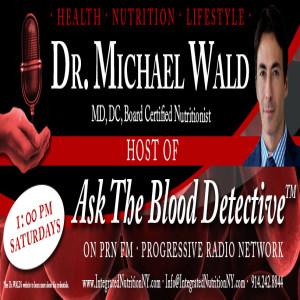Episodes

Saturday Mar 02, 2019
Ask The Blood Detective - Emotional Eating - Do you do it!
Saturday Mar 02, 2019
Saturday Mar 02, 2019
Emotional eating, otherwise known as stress eating, is an all too common problem affecting both men and women of virtually all ages. What is even more sad about this problem is that it is in adequately recognized, and therefore treated, and psychiatric and nutritional circles. My intention during this short article is to outline the major considerations for emotional eating and what you can do to modify emotional eating if you are affected by it. Furthermore, by recognizing emotional eating in yourself you will start to recognize it and others.
Perhaps the first concepts regarding effective management of emotional eating is to address its root cause or causes. Emotional and physical stressors and depression are a few examples of the underlying causes which may manifest in one’s life as emotional eating. If one attempts to manage emotional eating without first identifying its causes than any attempts to manage it nutritionally and or through other modalities such as acupuncture, fancy dietary changes and I like I doomed to fail.
Once you have identified and begin to properly manage the root causes of emotional eating you are well on your way towards building a solid foundation for a healthy or emotional and physical life. Once you learn, to work with a therapist and a psychiatrist or health coach proper strategies for managing underlying causes of stress eating it is a sensual to practice the coping skills that you have learned throughout your life - and especially during the most stressful times of your life. This last point is not want to be taken lightly meaning that if you can effectively manage your emotional stressors that are at the root cause of your emotional eating you will build even stronger coping strategies. To put it simply, effectively coping with stress eating during the most stressful times of your life will make it easy for you to manage stress eating during the less stressful times of your life.
When you find yourself staring at those foods that you probably should not have ask yourself, “am I really hungry“. If you are not hungry simply walk away. This is what I call awareness development for emotional or stress eating. If an individual, such as yourself, is on automatic and emotionally eating without the recognition of the fact that emotional eating is occurring in that moment then there is no chance that you can break the pattern. So develop you are, “awareness development“ by asking yourself at all points when you eat, “and I really hungry“ and if not walk away.
For a practical perspective, it is important for you to eliminate all of the worst foods and snacks in your house. Sugary foods, refined and processed carbohydrates, salty and fatty foods for example promote adverse brain chemistry and function. To say it another way, eating poorly causes poor chemistry and poor brain health. Some foods, such as sugar, can actually increase the production of stress hormones in your body which can promote not only emotional eating but can lessen your overall ability to deal with stress. Unhealthy foods, such as those I have mentioned above, have been shown to promote inflammation in the brain. Inflammation in the brain is now believed to be an underlying factor that causes or promotes all manner of emotional and psychiatric problems ranging from schizophrenia, depression, anxiety and even bipolar.
Changing your nutritional chemistry involves that you have in your home, in place of unhealthy foods, foods that are lower down on the food chain. For example, plant foods such as fruit and grains and vegetables are generally far healthier than most other foods in the diet. This does not mean that you cannot eat higher up on the food chain which would consist of animal products but you might want to limit their consumption particularly if you find yourself emotionally eating. On the other hand, it is important not to indulge in fad diet‘s that may be overkill for your purposes of dealing with emotional eating. For example, illuminating gluten if you do not have a gluten problem is not wise as it removes needed protein from the diet which is required as a precursor for amino acid production and therefore neurotransmitter production in the brain and has removed a major food from the diet which may result in feelings of frustration in terms of food choices.
There is some evidence that the consumption of green tea,and white tea may help offset the low serotonin and/or dopamine levels that are sometimes associated with emotional eating. These teas contain varying amounts of an important “happy” amino acid known as L-theanene. One should not expect that the consumption of cream cheese will cure their emotional eating but often a combination of small things like replacing unhealthy foods in your diet with healthier ones, getting good sleep, the consumption of these teas, and the appropriate psychological care often goes along way towards managing stress eating. Finally, keeping a food/emotional journal is essential for identifying when you are emotional eating so that you can "ride out the storm" breaking emotional-neurological habits and start to break the pattern of harmful emotional eating behaviors.


No comments yet. Be the first to say something!